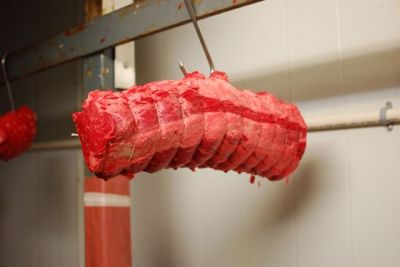 Hanging Beef
Hanging Beef
You don’t have to look very hard to find news about problems with meat products destined for our dinner tables. The big news over the past couple of weeks has been associated with horsemeat being found in food products that should have contained beef. That’s more of an international story, but here at home there have been more recalls of frozen hamburgers that may be contaminated with e coli bacteria. Some frozen burger patties sold by Canada Safeway with a best before date of August 14th have been recalled, and CBC News is reporting that two cases of e coli illness are connected to beef subject to the Canadian Food Inspection Agency alert. There have also been 5 other cases reported after a recall of beef products in December sold by the Loblaws chain of supermarkets. So it seems despite best efforts to make sure our beef processing system is clean, contamination is still happening.
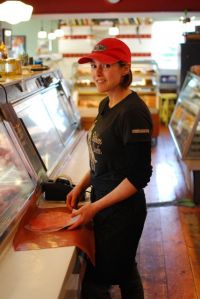 Village Butcher Co-Owner Rebecca Teskey
Village Butcher Co-Owner Rebecca Teskey
There will always be a chance of getting some food-borne illness no matter how careful you are, and labels can always be a problem, but I believe if you buy your protein from a shorter food chain you have less of a chance of getting sick and a better chance of eating something that is really going to impress you with quality and flavour. On Saturday I paid a visit to the Village Butcher on Oak Bay Avenue here in Victoria. The place was hopping, but owners Michael Windle and Rebecca Teskey took some time out from behind the counter to talk to me about how they take a lot of care in selecting their beef and other proteins for their customers. First, though, I asked them about what they thought when they heard about the horsemeat controversy. They said they were disappointed, but not surprised. They appreciate that horsemeat is something people eat in some cultures (they’ve never had anyone ask for horsemeat at their butcher shop), but they are against the idea of people not knowing what they are eating. (the horse meat news has actually boosted consumption of that protein in Canada!) At the Village Butcher they are very careful about where their products come from. They only purchase whole carcasses, as often as possible from Vancouver Island farms. Most of their pork comes from one farmer in Metchosin. Michael does all the lamb slaughtering on south Vancouver Island. So they know the farmers, they know the people who work in the abattoirs, so they have a pretty solid traceability.
The federal government spends a lot of money on our food inspection system, and Michael is quick to point out that we do have good systems, but they are more reactionary. Once a food has been identified as having a problem, we know where it came from and where it’s been sent. The province of British Columbia is taking over meat inspection from the Canadian Food Inspection Agency in 2014. But we still don’t really know what’s in it, especially when it comes to a product like a hamburger patty, the label says it contains beef, but that could be anything that came from the cow, including some parts you may not want to have in your burger; they only use muscle meats in their burgers.
I wondered whether Michael and Rebecca see a big uptick in sales whenever there is some sort of recall, but the answer is no, not really. They do notice that their customers always want to talk about the recalls, though, as it seems to reinforce their decision to patronize an independent butcher shop. And although Rebecca doesn’t expect people to start shopping at their shop in droves, she’s encouraged by the growth in the small butcher industry, but there’s still some education to be done: “I think it’s great that people are going to more places like ours because it means they care more about where their food comes from. But one thing I have noticed over the past few years is that people don’t know how to handle their meat and cook it, their knowledge of those skills has dramatically declined.”
If you find prices at a small butcher shop are a little higher, there’s no way they can compete with the volume purchases that the large retailers can make from those large meat processors. But the difference in quality and flavour can make up for the price…eat a little less, taste a little more. I asked Michael to identify which products he thinks really showcase the difference in their products, and he recommended some grass-finished beef. On the show this week I barbecued an incredibly juicy and flavourful Village Butcher sirloin hamburger (they added some bone marrow, too!) as well as a skirt steak they had marinated in a chimichurri sauce. The steak is best seared rare and sliced against the grain and it had a fantastic beefy taste as well as a kick from the marinade.
Rebecca told me that the growth at their shop means a chance at continued existence for the small farmers who supply them. Their pig farmer in Metchosin, for example, was able to go ahead and build new barns and add other infrastructure based on the weekly orders from the Village Butcher, and he and another farmer are using putting previously fallow Agricultural Land Reserve acreage back into production: “They’re using parcels of land that people own but don’t want to farm. They grow oats and barley to feed their pigs, and when we had that shortage of feed last year in the rest of the country, there was no effect here, our prices didn’t even have to change, because all the feed for the pigs we buy came from Vancouver Island.”
Who is your favourite butcher on Vancouver Island? Who do you like for their selection, service and price? Let me know in the comments section…
To listen to this week’s radio column, visit this page on the All Points West website.
***update! Michael and Rebecca are planning a series of short classes covering everything from knife handling and sharpening to chicken disassembly and boning. Keep checking their Facebook page for updates and times.***

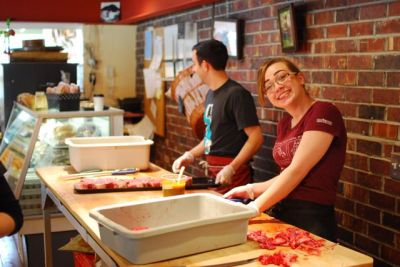
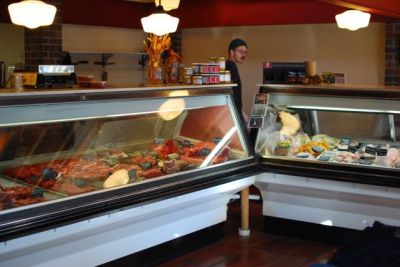
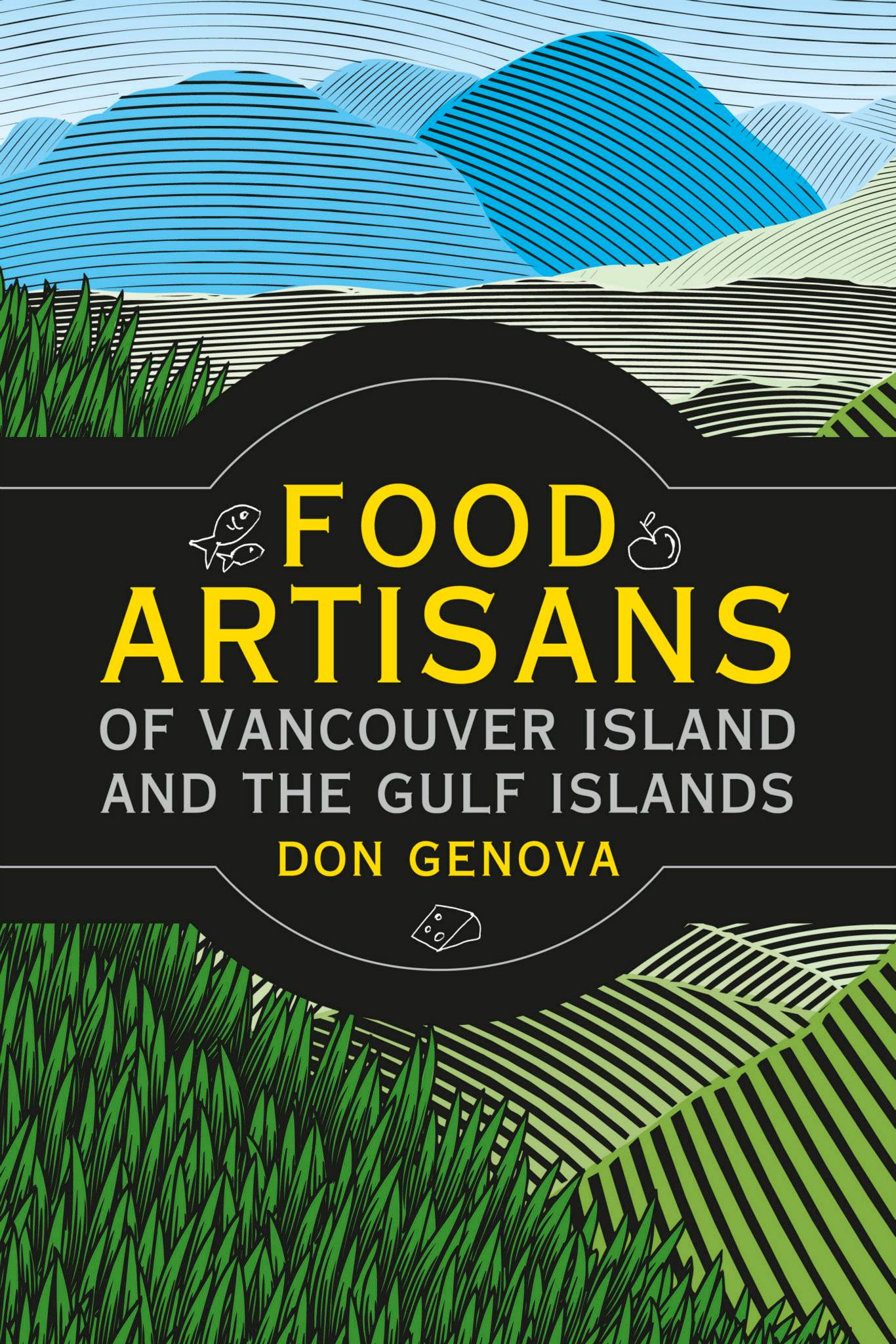

Don, I really enjoyed your piece on sourcing local meats. This is precisely how Two Rivers Specialty Meats came to being just five years ago. Our business has grown from one head of Pemberton Meadows Natural Beef delivered every two weeks; broken down, dry-aged, cut, packed and sold to now supporting over 20 farms and selling many millions of dollars in annual sales.
The founders of Two Rivers, Jason and Margot Pleym, saw a gap in the food service supply chain in BC of easy access to locally raised, sustainably farmed meats. There were/are lots of meat suppliers distributing comomodity/conventional/imported meats but nobody was supporting those who were struggling to raise animals “in our back yards”. There wasn’t really a vehicle for them to get their products into the kitchens of the finest restaurants in the province.
We have now expanded onto Vancouver Island, Kamloops, Kellowna, Whistler as well as the lower Mainland. In 2011 we won Supplier of the Year at the Van Mag Awards and in 2012 Jason won Top 40 Under 40 in Vancouver. We now sell into the retail market and will soon be selling direct-to-consumer. We are very proud to support local producers and and to provide them the avenue to get their products into the mouths of BC’ers.
We would be honoured to speak to you further about what we do and where we’re going. Check us out on Facebook or follow us on Twitter @tworiversmeats to better understand what we do and what our customers think.
Most sincerely, Gian Linuzzi
Pingback: Food Matters - Tis the Time of Year for Lamb
Personally, I found this shop to be grossly overpriced. I understand that quality meat is going to be more expensive, but not to this degree. I’ve purchased meat from various other butcher shops in Victoria and Nanaimo for a much more reasonable price..
I especially dislike the fact that this shop in particular prices their meat by the /100g instead of /lb. I’m unsure whether this is meant to mislead people into thinking the meat is reasonably priced.. I don’t think cheap cuts of meat/ground should be $2.00/100g. That’s $8.50/lb!! Am I alone here?? I honestly can’t believe it!
I’m a little confused by Fred’s comments on price. Many staff and customers have noted that our prices are either comparable or not much higher than grocery stores like Thrifty’s, particularly for a comparable ethically raised product.
We price things by the 100g (or by the kg) because it provides the most accurate measurement, we can go up or down by the gram. One pound is 454grams, calculating any fractional amount of that is confusing for customers. However, we are happy to make the weight conversion upon request as it is easily done.
By the 100g is also standard pricing measures across the board for many food products.
Most of our grounds are priced between $1.33/100g (13.30/kg) and $1.66/100g (16.60/kg), with some of the more expensive meats being higher. Just as an example for you, there are some animal carcass’ that we buy for more than $11/kg. Yield is 60-70% for a talented butcher, so any meat from that animal is now just under $15.50/kg AT OUR COST, that is without factoring in any labor or operating costs.
So even $2/100g is reasonably priced.
What you seem to be forgetting is that NO meat or poultry, when ethically raised on natural feed, with adequate space and no antibiotics or hormones will ever be cheap. It never has been. Cheap meat/poultry is a myth with high environmental, moral and human/animal health costs.
Pingback: Food Matters - Knifewear